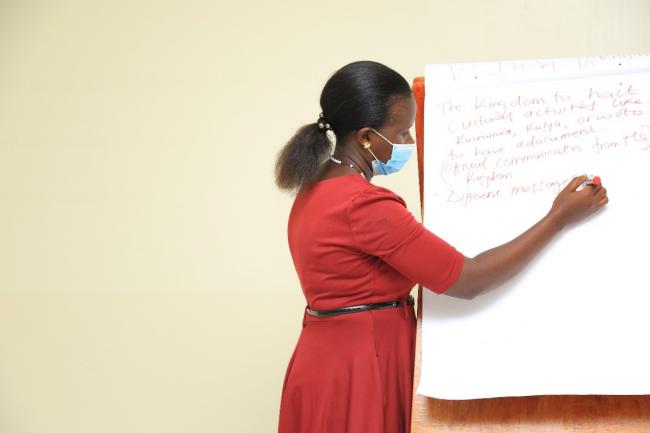IRC Uganda, Caritas Fort Portal HEWASA and the Tooro Kingdom are working together in the fight against COVID-19 in Uganda's Kabarole District.
Published on: 11/10/2021
By Monica Komucunguzi, Environment Officer at Caritas Fort Portal HEWASA and Naomi Kabarungi, IRC Uganda, editor and contributor
Kabarole District, IRC’s long-time local government partner in Uganda is situated in the Tooro Cultural Kingdom in Western Uganda and hosts the kingdom palace at Karuziika Hill in Fort Portal City. The Tooro culture has different cultural norms that they hold dear, and they have cultural leaders whom they respect highly. The Tooro or Batooro live in communal settings during many functions like marriage ceremonies that involve sharing of coffee beans in one basket, sharing alcoholic drinks, sharing milk pots, burial norms (lighting of fire, paying last respects, eating at funerals) and coronation anniversaries. These cultural norms highly contribute to the spread of the COVID-19 virus.
IRC Uganda has collaborated with Caritas Fort Portal HEWASA to lead engagements with the cultural leaders from Tooro Kingdom to promote positive hygiene behaviour and facilitate risk communication.
The ideologies of social distancing, curfew, and limited numbers at communal ceremonies are unfamiliar in the Tooro culture. Many are still struggling to overcome this shock and are questioning their culture, yet they have to believe in scientific standard operating procedures (SOPs) to overcome the COVID-19 virus.

Mr Peter Sunday Rusoke, Minister for Culture in Tooro Kingdom, speaks at the cultural leaders strategic meeting on hygiene promotion campaigns
An interactive meeting was held which was attended by the prime minster, the ministers for culture, education, information, youth, health county chiefs, kingdom administrator, royal guards and the media. The objective of the meeting was to engage cultural leaders in risk communication on COVID-19 and health promotion.
The first Deputy prime minister Mrs. Harriet Nyakake in her opening remarks said: “the COVID-19 virus or any other water, sanitation and hygiene related disease will not be eliminated by witchcraft or any other traditional means, there is need for applying medical and other practical measures”.
The cultural leaders in this meeting agreed to be role models in ensuring they follow SOPs as well as embedding health practices into culture and cultural events. They agreed to have a document signed by the king to temporarily suspend some of the cultural norms especially at burials. “According to the Tooro culture the Kingdom can redirect the cultural norms where necessary depending on the prevailing situation. So, the cultural norms that spread COVID-19 can be changed by the king at any time “, said Mr Peter Sunday Rusoke, the Minister for Culture in Tooro Kingdom.

Monica Komucunguzi from Caritas HEWASA facilitates at the strategic meeting with cultural leaders
The joint actions adopted at the end of the dialogue included:
Mrs Resty Kabahuma, the secretary for health and doubling as a Village Health Team member in her village, committed to be vigilant and ensure practicability of SOPs in her village. "I will ensure all homes in my village have handwashing facilities with soap and the SOPs are followed especially at burials and other cultural ceremonies”.
Mr Steven Birungi, project officer at Caritas Fort Portal HEWASA, made a call to all members on how the success of the response to COVID-19 in Tooro region and beyond depends on the engagement and cooperation of communities in behaviours that may seem very costly to societies and families. He re-echoed that ” Everything from the economy, to religion, social interaction and culture has squarely been affected by COVID-19 and returning to normalcy requires social mobilisation, community-based surveillance as well as a change in norms and culture. It will also require organisations to apply strategies and share insights on the best practices. This will be one of the ways to overcome this pandemic.